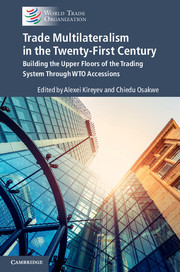 Trade Multilateralism in the Twenty-First Century
Trade Multilateralism in the Twenty-First Century Book contents
- Frontmatter
- Contents
- List of Plates
- List of Figures
- Notes on Contributors
- Foreword
- Acknowledgements
- List of Abbreviations
- Disclaimer
- 1 Making Trade Multilateralism Work for All: The Role of WTO Accessions
- PART I WTO Accessions and the New Trade Multilateralism
- PART II Negotiators’ Perspectives on the WTO Accession Process
- PART III Accessions Acquis: Thematic Perspectives and Implementation Challenges
- Contributor Biographies
- Index
- References
1 - Making Trade Multilateralism Work for All: The Role of WTO Accessions
Published online by Cambridge University Press: 28 November 2017
- Frontmatter
- Contents
- List of Plates
- List of Figures
- Notes on Contributors
- Foreword
- Acknowledgements
- List of Abbreviations
- Disclaimer
- 1 Making Trade Multilateralism Work for All: The Role of WTO Accessions
- PART I WTO Accessions and the New Trade Multilateralism
- PART II Negotiators’ Perspectives on the WTO Accession Process
- PART III Accessions Acquis: Thematic Perspectives and Implementation Challenges
- Contributor Biographies
- Index
- References
Summary
Abstract
Trade multilateralism, i.e. global trade based on negotiated and agreed rules by the World Trade Organization (WTO) membership, faces various challenges. Slow economic growth, changes in the balance of global economic power and inequitable distribution of growth benefits have called into question the benefits of globalization and the rules-based global order. Trade has been the target of a barrage of criticism from many quarters and has become a lightning rod for policy failures, weaknesses in international cooperation and the adverse effects of rapid technological advances on jobs and incomes. In this tortuous and uncertain environment, concerted policy actions along several strategic axes are needed to put trade back on track and make trade multilateralism work for all once again. First, trade multilateralism must be used as a tool to restart global economic growth and job creation, while managing uncertainty and risks. Second, a global trading system anchored in the WTO – with strong, well-enforced rules that continue to adjust to promote competition and a level playing field – remains critical. Third, the new realities of the twenty-first century compel an upgrade of the multilateral trading system by the building of its upper floors on the foundation of the existing trade rules and accumulated acquis and expertise. Such a system would preserve the fundamental set of rules at the core of the multilateral system, abolish or revise obsolete rules, which have not stood the test of time, and adopt new rules that would reflect new realities. Fourth, accessions to the WTO are arguably the most vibrant component of the multilateral trading system and have already made important contributions to each of these policy directions. The objective of this book is to draw on recent accession experiences to distil the impact of accessions on the constantly evolving architecture of the multilateral trading system.
Trade multilateralism at a crossroads
Trade multilateralism has been under stress following the transformation of the global environment in recent years. Political developments have revealed a fraying consensus on the benefits of international economic cooperation. While trade integration has helped to drive economic growth across the world for decades, recently an uptick in protectionism and inward looking policies have been a drag on trade and growth.
- Type
- Chapter
- Information
- Trade Multilateralism in the Twenty-First CenturyBuilding the Upper Floors of the Trading System through WTO Accessions, pp. 1 - 26Publisher: Cambridge University PressPrint publication year: 2017


